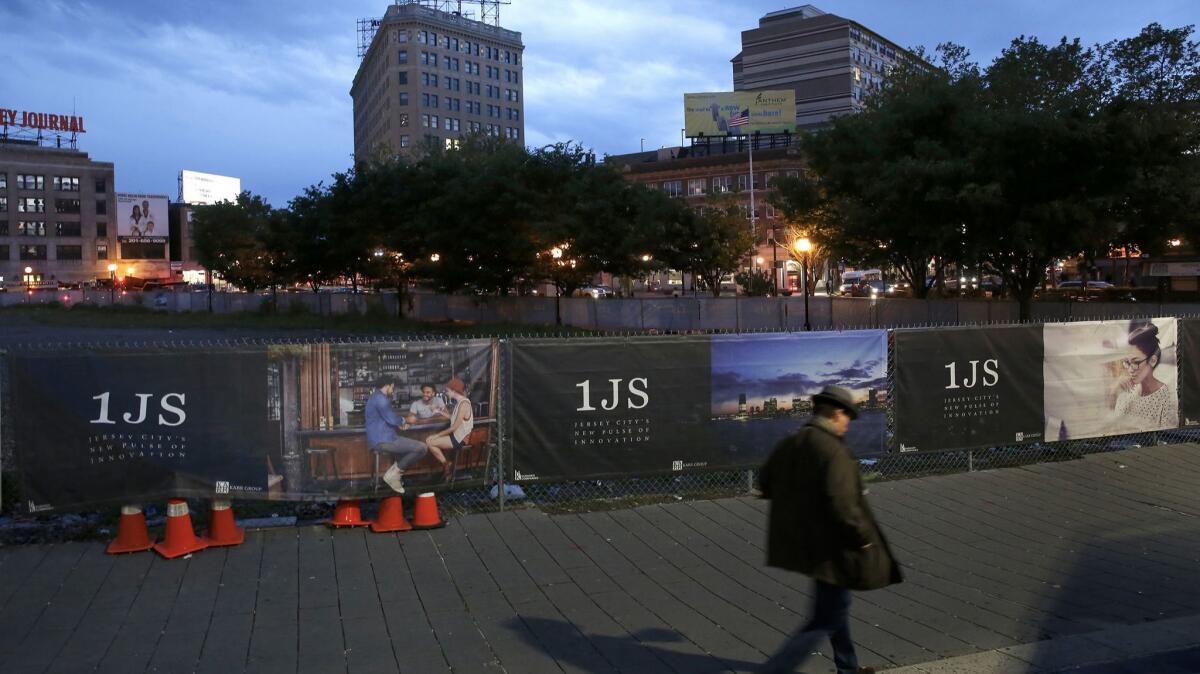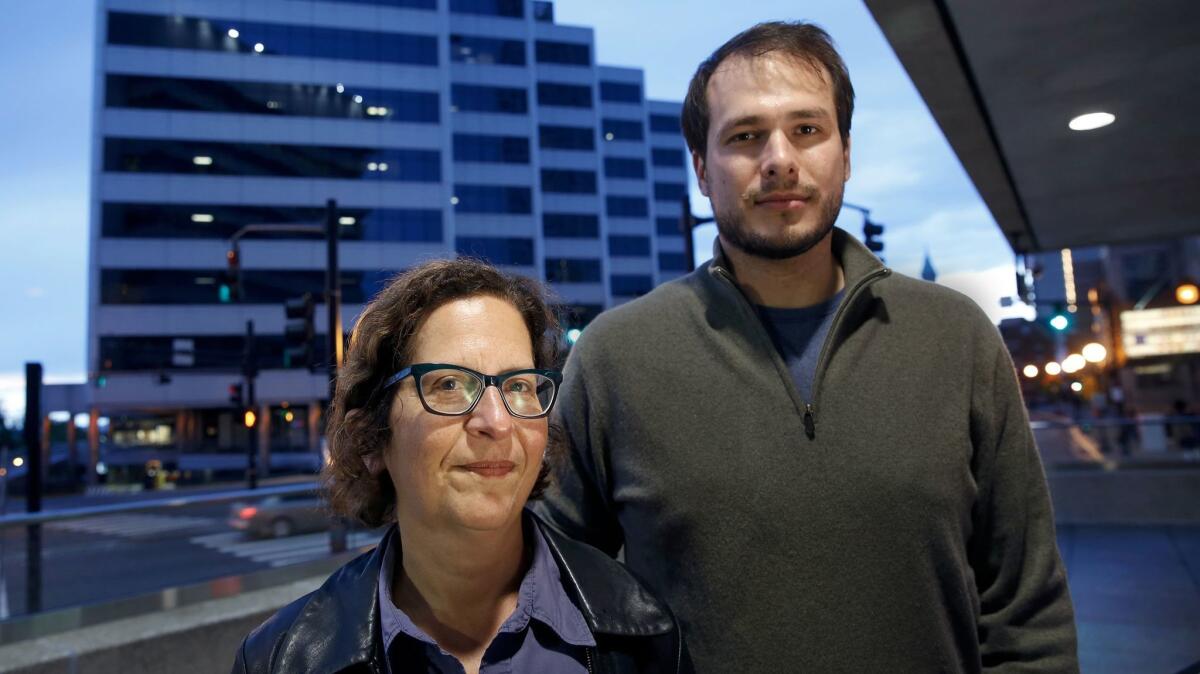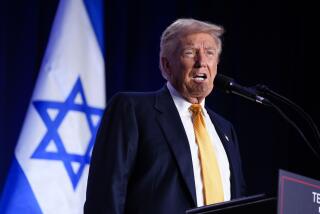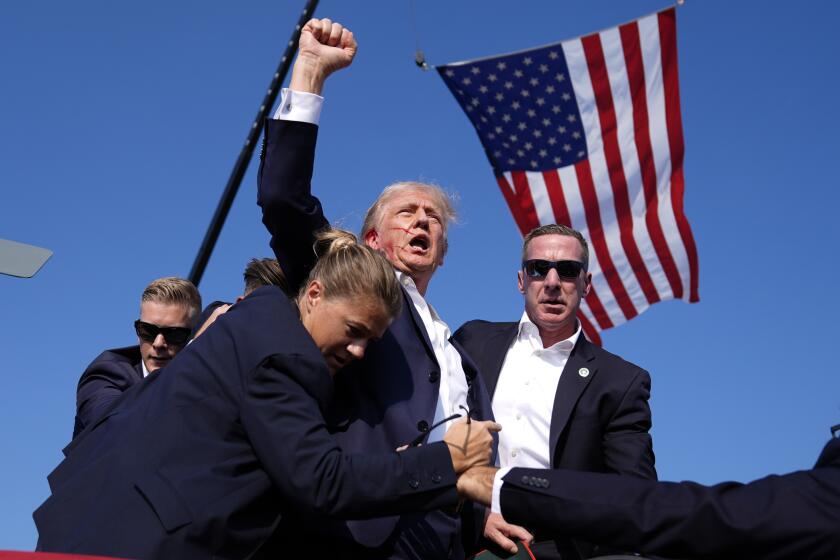Jersey City has turned sharply against Donald Trump’s son-in-law, Jared Kushner

Being related to President Trump is not a blessing in Jersey City. (July 5, 2017) (Sign up for our free video newsletter here http://bit.ly/2n6VKPR)
Until he stepped aside from his real estate business to become a senior White House aide, developer Jared Kushner was a major player in the gentrification of Jersey City, where former railroad yards and waste sites are being transformed into luxury housing.
His company built a high-rise branded with the name of his father-in-law, Donald Trump, featuring a gold-hued marquee and skyline views of lower Manhattan. It was embarking on a twin-towered $800-million compound that would have dominated downtown’s Journal Square, and bidding on a 100-acre industrial site to build 8,000 homes to be marketed to Orthodox Jews.
But being related to President Trump is not a blessing here.
Since the presidential election, Jersey City has turned sharply against Kushner. Opposition to Trump runs deep here, and the city has been taking out some of that hostility on the Kushner Cos., withdrawing political support for high-profile projects and shining a spotlight on the company’s business practices.
Mayor Steve Fulop, a personal friend of 36-year-old Jared, abruptly yanked his support for a tax abatement at Journal Square in May. Several other Kushner projects have run into intense public opposition, with community activists accusing the Kushners of hiding campaign contributions, abusing a federal program designed to promote development in poor areas, and selling visas to Chinese investors while the Trump administration is cracking down on immigration.
“Trump is toxic in Jersey City,” said Bill Matsikoudis, a lawyer and former city official who is running for mayor against Fulop.
Historically steeped in Democratic-machine politics, the city now has a large population of immigrants, young professionals and minorities. Few of them voted for Trump, who got 14% of the vote here in the presidential election.
Plenty of people here also hold a grudge against Trump because of his claim during the presidential campaign — soundly debunked — that “thousands and thousands” of people in Jersey City were cheering on Sept. 11, 2001, when the World Trade Center came down.
“The Kushners are woven into the fabric of a lot of communities in New Jersey, but the problem for them is that none of those communities like Trump,” said Matt Hale, a political scientist at Seton Hall University in Newark. If you anger someone in New Jersey, he added, “You don’t get the tax abatement. That’s the transactional nature of New Jersey politics.”
Fulop has said his decision to pull his support for the tax abatement had nothing to do with his friendship with Kushner, from whom he said he received no campaign contributions.
The mayor’s “support or lack of support” for the project, said spokeswoman Jennifer Morrill, “is based on what is financially best for Jersey City.”
Kushner Cos. officials have emphasized that official support for projects in Jersey City has always come not in response to campaign contributions, but in recognition of their developments’ potential to provide tax revenue and jobs.

Kushner has stepped down from his CEO role at his family’s company. But the fact that he retains ownership in some of its properties has raised questions here about whether there are inherent conflicts in being a real estate developer while holding a high federal position.
Despite the glamorous image presented by Kushner, especially posing next to his wife, Ivanka Trump, his family has been known for years in New Jersey as bread-and-butter developers who owned small apartment complexes, industrial lots and a trailer park. They were generous philanthropists, especially for Jewish causes, and donors to Democratic politicians and causes.
New Jersey can be a perilous place to do business, and developers often are expected to make political contributions and form political alliances in order to get their projects off the ground.
In 2004, Charles Kushner, Jared’s father, was indicted for making illegal campaign contributions and tampering with a witness — his own brother-in-law, whom he set up with a prostitute to retaliate for testifying against him. The case cemented a long-running family feud and earned Charles Kushner a two-year prison sentence.
That left Jared, just a few years out of Harvard, to run the company as chief executive officer. He stepped down before taking the White House job, but retains an interest in some of the Jersey City projects, including the Bay Street project, according to his financial disclosure statement.
Even recently, his company was showing tremendous potential in Jersey City. The young developer and the mayor seemed a perfect match, publicly heaping compliments on each other at the 2014 groundbreaking for the Trump Bay Street project. “I wanted to say to Jared specifically, it’s been really great. We have been able to develop a terrific friendship here,” Fulop said. Kushner returned the praise, calling the mayor “a big advocate for development ... and for doing what’s really right for the city.”
But the political tide in town began to turn against the Kushners in Jersey City shortly after the presidential election.
Some ordinary citizens, unhappy with Trump’s election, began publicly voicing opposition to his son-in-law’s development footprint in Jersey City.
“Many of these buildings being built literally shadow over the populations that Trump is attacking in Jersey City,” said school Principal Oscar Velez of PS 22, where immigrant pupils were in tears after the election, fearing their parents would be deported.
“Trump can’t go and spew venom about these people and Jersey City and then have an organization using his name ask for tax abatements and favorable treatment,” he said.
The Kushners also were sharply criticized after a sales conference last month in Beijing’s Ritz-Carlton Hotel, where Nicole Meyer, Jared’s sister, appeared to drop references to the family’s relationship to Trump in an attempt to attract financing for the Journal Square project. In her speech, she mentioned a federal program that gives preferential visas in exchange for investment. The Journal Square project “means a lot to me and my entire family,” she told potential investors.
Another branch of the Kushner family also seeking low-cost financing for a Jersey City project was even more explicit in using its Trump connection, running a promotion in Chinese that advertised: “Work hand-in-hand with Trump son-in-law Kushner.”
The pitches by the Kushners drew protests from ethics watchdogs, who have been vocal critics of the first family’s business interests.
Hale, the Seton Hall political scientist, said that social media in New Jersey “exploded at the horror of the Kushners looking like they were selling visas to finance their real estate in New Jersey.”
Kushner Cos. hastily issued an apology: “Ms. Meyer wanted to make clear that her brother had stepped away from the company in January and has nothing to do with this project,” the firm said in a statement. But the damage was done. Fulop had already announced on Facebook that he had dropped his support for the tax abatement and other state and municipal subsidies.
Kushner Cos. also withdrew its application to develop the 100-acre housing tract for Orthodox Jews.
The China episode cast a spotlight on the Kushners’ use of the federal visa program known as EB-5, which was designed to attract foreign investment to economically depressed areas by offering green cards to people who invest at least $500,000 in places where the unemployment rate is at least one-and-a-half times the national average.
The Kushners were seeking additional financing to expand their 50-story luxury compound, Trump Bay Street, in one of Jersey City’s most prosperous neighborhoods. The property is just a few blocks from the Hudson River and caters to young Wall Street professionals and tech workers. The cheapest apartment rents for $2,795 a month.
To qualify for the foreign investment program, which would allow them to borrow cheaply, Kushner Cos. submitted a map that linked the upscale neighborhood to poor census tracts up to four miles away.
“There are many distressed urban neighborhood in this city that need development, but not this one,” said James Solomon, a political scientist who lives in Jersey City and is one of the organizers of a group called Evict Trump-Kushner from Jersey City. “They gerrymandered the documents to make it look like there was high unemployment.”
Gary Friedland, an expert in real estate finance at New York University who has called for reforms in the EB-5 program, said the manipulation of census tracts is so common that “if it was not the Kushners, you wouldn’t be writing about [it].”
Still, he added, “It is an abuse of the whole concept of the program. This special incentive was supposed to be reserved for areas that cannot attract conventional capital, particularly rural areas and distressed inner cities.”
Such abuses have led to a bipartisan drive in Congress to abolish or reform the EB-5 program, but the president extended the program in May when he signed legislation to fund the federal government budget until September.
Ethics watchdogs complain that conflicts of interest are inevitable because members of the first family haven’t adequately separated themselves from their business interests.

Kushner has not entirely divested his portfolio, but has sold it to a family trust. And he still owns interests in several Jersey City projects, including the headquarters of the local newspaper, the Jersey Journal, and the luxury apartments called Trump Bay Street. With that development, the Kushners are in the process of trying to raise $250 million in financing to pay off the construction loan and the Chinese investors, which might mean tapping international lenders.
“Members of the Trump family are going to have to take remedial steps [to divest], and until they do, it is going to be a source of controversy for all of them — the president, daughter and her husband. It casts a pall over every decision they make,” said Norman Eisen, a former White House ethics czar who now runs Citizens for Responsibility and Ethics in Washington.
The Kushners’ higher public profile also has reopened a festering controversy over secretive campaign contributions from 2015 when Fulop, a former Goldman Sachs executive, was considering a run for state governor.
At that time, a political action committee reported to be supporting a possible gubernatorial bid by the mayor received $400,000 from a nonprofit called Progressive New Jersey Inc. that didn’t disclose its donors. One of them was later revealed to be Kushner Cos., which had given $100,000.
That campaign contribution, which has since been returned, has become an issue in a contentious mayoral race. Fulop challenger Matsikoudis says the contribution was made as the Kushners were negotiating to develop the vacant 100 acres and looking for tax abatements and help applying for state loans.
“To me it is 100% corrupt to give a secret campaign contribution that way,” said Matsikoudis. “I can’t say that it was a quid pro quo bribe, but everyone was aware what was at stake for the Kushners in Jersey City at that time.”
Fulop himself declined to comment, but Morrill said the mayor had not received any campaign contributions from the Kushners and denied that the PAC was for his benefit, or that the friendship between Jared Kushner and the mayor had any bearing on development projects.
Kushner Cos. declined to comment on the donation. A spokesman, James Yolles, said the company remained committed to Jersey City and especially the Journal Square project.
“We are committed to moving ahead with this meaningful investment in the long-term future of Journal Square, which will provide nearly 4,000 union construction jobs, a memorial plaza, and $180 million in tax revenue for Jersey City over the next 30 years,” he said.
ALSO
Kushner tapped program meant for job-starved areas to build a luxury skyscraper
After 150 days, Jared Kushner speaks
Vice President Mike Pence stays loyal to Trump, but it could come at a cost
New York police officer dies after shooting in the Bronx; suspect dead
More to Read
Sign up for Essential California
The most important California stories and recommendations in your inbox every morning.
You may occasionally receive promotional content from the Los Angeles Times.










